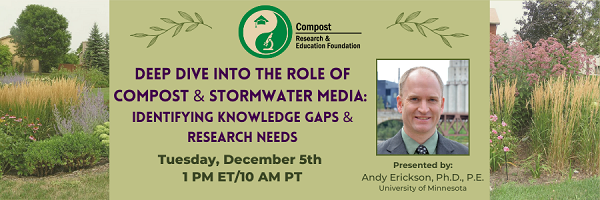 |
||||||||||||||||||||||||||||||||||||||||||||||||||||||||||||||||||||
| Past Issues | Subscribe | Send to a Friend | compostingcouncil.org | ||||||||||||||||||||||||||||||||||||||||||||||||||||||||||||||||||||
The EPA’s new Food Waste Scale is a long-awaited recognition of the importance of composting inedible food scrap and will bring much needed clarity to this issue. The USCC has been urging EPA to make this change for the past decade. The Food Waste Scale revisits the food waste hierarchy and changes the framework to prioritize actions that prevent and divert wasted food from disposal. Tiers of the scale highlight different pathways for preventing or managing wasted food in order from most preferred to least preferred. The USCC believes composting is the superior and most economical option for inedible food scraps.
Recent member survey results show USCC members are in support of reopening the discussion on the definition of compost within NOP’s current rules, as a result of a petition filed by the Biodegradable Products Institute (BPI) with the U.S. Department of Agriculture (USDA) in September of this year.
This petition requests the USDA to update the definition of compost within the National Organic Program (NOP) to include certified compostable products that meet American Society for Testing Materials (ASTM) standards D6400, D6868, and D8410. This position would align national policies with state regulations that favor ASTM compliant compostable packaging. It also signifies a move with far-reaching implications for the composting industry if BPI is successful. Policy change could allow facilities that accept compostable products to sell to organic farms.
If the petition is opened, BPI plans to argue that the current definition of compost within the NOP may be disproven by current research, technological innovations, and investments being made by organic farmers, composters, and compostable product manufacturers.
The US Composting Council (USCC) and Biodegradable Products Institute (BPI) this month released a set of guiding principles to inform model legislation for labeling compostable products. The principles were developed after months of consensus-building by a task force composed of both organizations’ members—including compostable product-makers, certifiers, municipal leaders, allied members of USCC, and compost manufacturers.
Task Force members agreed that products should be labeled with distinguishing elements including tinting and striping and the use of certification logos, while non-compostable items should be prohibited from using identical labeling and misleading terminology. Additionally, all compostable items should be defined by required lab testing and are encouraged to consider field testing.
“The Compostable Labeling Task Force debated how best to communicate to policymakers the challenges involved in ensuring compostable products make it to compost manufacturers, are easily identifiable, and break down in compost facilities,” said Frank Franciosi, executive director of the US Composting Council. “Having representative voices at the table ensured that the principles reflect the real-world conditions and the business choices facing compost manufacturers. We hope product manufacturers, brands and regulators will quickly and voluntarily adopt these principles.”
The US Composting Council's homepage now boasts a modern, intuitive design that enhances user experience. A simplified layout and visually appealing elements contribute to a more engaging and informative browsing experience. Building on the homepage and member join page redesign, the USCC further optimized its website by reorganizing the navigation structure last month. With the top navigation now consisting of five main items; Compost, Tools & Resources, Programs, Advocacy, and About. This step ensures that users can effortlessly access crucial information without unnecessary complexities.
Did you know that volunteering at COMPOST2024 entitles you to full admission to all conference sessions and the equipment show? Positions are limited and volunteer openings are expected to fill out by the end of this month. If you are a Young Professional looking for ways to offset registration costs, we recommend submitting your volunteer application at your earliest convenience. Click the button below to learn more and to apply.
USCC and many other advocacy organizations reached out to their Congressional representatives, including Community Compost Grants. Thank you to the 287 people who reached out to your Congressional Office to urge restoration of the funding. The $50M which we and other organizations asked for was not in the bill, and we will continue to advocate for more funding for these programs. The Office of Urban Agriculture and Innovative Practices, created in the 2018 Farm Bill, is at risk of being unfunded in this year’s federal appropriations office—putting in jeopardy programs such as the Composting and Food Waste Reduction Grants and Urban Agriculture Innovation Grants. These programs need to also be in the Farm Bill and funded to remain in place in future years. For more information, visit the following sites:
USCC’s Advocacy Team met with staff from five Congressional offices to continue to highlight infrastructure funding and the need for compost data collection to be removed from Superfund liability that was proposed by the EPA for the small amounts of PFAS present in compost.
Staff from Sen. Alex Padilla (D-CA)’s office, Sen. Mark Kelly (D-AZ) listened to composters and others from their district but did not commit on any of the measures yet—the Compost Act and Recycling, PFAS exemption bills and Compost Accountability Act. However, they were very receptive to tours in the Congressional districts to learn more about our industry. USCC and our members in their district are following up to press for support.
For the Padilla meeting, the team was joined by a number of California members, including Dan Noble of the USCC California Chapter, Neil Edgar, California Compost Coalition, Christine Lenches-Hinckel of 301 Organics, Tim Goncharoff of TAG Consulting, Christy Pestoni of Waste Connections, and Jeff Ziegenbein of Inland Empire compost facility. The Arizona meeting was joined by Chris Seney of Republic’s organics team.
The North Carolina Composting Council (NCCC) is seeking to hire an Executive Director to be an effective leader who will help grow the organization to its greatest potential.
Hours will average 20 hours/week, depending on the season. The successful candidate can work remotely but must be able to travel to the Raleigh area multiple times per year for events and meetings.
We are just 83 days away from COMPOST2024! We are thrilled to have fantastic presenters lined up for this year's event. We invite all of our members to attend COMPOST2024, our 32nd Annual Conference, Tradeshow, and Equipment Demonstration Day, which will take place in sunny Daytona Beach, Florida on Feb. 6–9.
SCS Engineers, a leading global environmental solutions provider, announces that the firm's Board of Directors elected Doug Doerr as President and Chief Executive Officer.
James Walsh, the current President and CEO, will turn over his responsibilities to Doerr on Jan. 1, 2024. Doerr, a Senior Vice President, has over three decades of professional engineering experience spanning the firm's solid waste and environmental services practices. He brings strategic direction and operations experience as SCS's geographically largest Business Unit Director. Doerr also serves on SCS's Board of Directors and was one of the founding principals of Aquaterra Environmental Solutions, Inc., which merged with SCS in 2013.
Author(s): Katya Forsyth, Sustainability Project Manager
Coryanne Mansell, Consultant at Resource Recycling Systems (RRS) The US Composting Council (USCC) congratulates the composting programs included in the list of recipients for the US Environmental Protection Agency’s (EPA) Solid Waste Infrastructure for Recycling (SWIFR) Grant Program in September. With this initiative, the EPA aims to enhance post-consumer materials management, local recycling programs, and upgrade waste management systems. Of the 56 recipients, seven will specifically advance their understanding and infrastructure concerning surplus food and waste.
Congratulations to the USCC State Chapters, as well as the states and cities that have received this funding!
The US Composting Council is seeking proposals from qualified firms experienced in conducting membership needs analysis for environmental non-profits. The aim of this project is to comprehensively assess the needs of prospective and existing members, including State Chapter members who are not currently USCC members. The ultimate goal is to refine the Council's value proposition, enhance member engagement, retention, and recruitment efforts.
The City of Modesto is currently seeking a candidate to join our Composting Operations Team as a Compost Facility Operations Supervisor. The Compost Facility Supervisor is responsible to plan, organize, direct, and supervise the work of crews engaged in compost site operations, maintenance, repair, and/or construction work; and to perform a variety of technical tasks related to assigned area of responsibility.
ICAW is also looking for more volunteer coordinators in each state to help with ICAW activities. If you are interested in learning more about being an ICAW volunteer, you can learn more HERE or contact Beth Simone, bethsimone@compostfoundation.org CREF is holding a webinar on Dec. 5 to share the results of a CREF-sponsored literature review and listening session on existing research in compost uses for stormwater bioretention. This webinar will highlight the findings, including best practice recommendations and gaps in knowledge that can guide the direction of future research. Presented by the project lead Dr. Andy Erickson from the University of Minnesota, this presentation will cover the benefits and shortcomings of using compost in stormwater filter media. Research gaps will be included to better understand the best use of compost in stormwater filter applications.
This research project was made possible by all the companies, organizations and individuals who generously donated to this project. CREF would like to thank all the donors for the support of the Foundation’s research projects.
Source: Yvette Cabrera and Darby Hoover, NRDC
For years, work in the U.S. on reducing wasted food has been framed by the EPA’s Food Recovery Hierarchy, a way of ranking the environmental preferability for solutions to reduce food waste. Now, the hierarchy has gotten a welcome makeover, evolving into the Wasted Food Scale, which provides a level of nuance that is reflective of current research and data. The new scale adds some categories (e.g. sending food down the drain to wastewater, which is ranked among the least preferable) and reorganizes others, including elevating the ranking of composting. As with the original hierarchy, the Wasted Food Scale affirms that prevention, or keeping food from going to waste in the first place, is still the best way to reduce the climate and other environmental impacts of wasted food.
|
||||||||||||||||||||||||||||||||||||||||||||||||||||||||||||||||||||
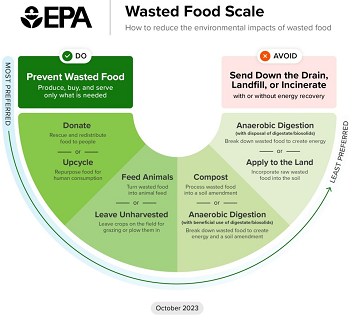
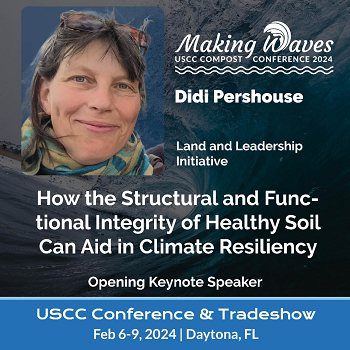 The Land and Leadership Initiative's founder, Didi Pershouse, will give the opening keynote address at COMPOST2024. Pershouse's talk is titled "How the Structural and Functional Integrity of Healthy Soil Can Aid in Climate Resiliency" and is slated for Wednesday, Feb. 7 from 10:00 to 11:30 a.m.
The Land and Leadership Initiative's founder, Didi Pershouse, will give the opening keynote address at COMPOST2024. Pershouse's talk is titled "How the Structural and Functional Integrity of Healthy Soil Can Aid in Climate Resiliency" and is slated for Wednesday, Feb. 7 from 10:00 to 11:30 a.m.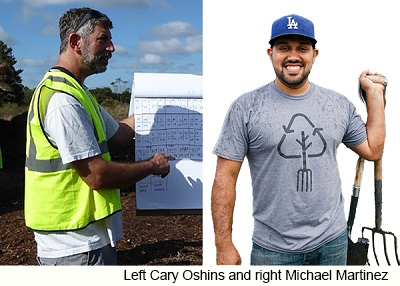 The US Composting Council (USCC) announces the outcomes of its annual Board of Directors election for the 2024 term. In the upcoming year, the Board will welcome two new members while retaining three familiar faces.
The US Composting Council (USCC) announces the outcomes of its annual Board of Directors election for the 2024 term. In the upcoming year, the Board will welcome two new members while retaining three familiar faces.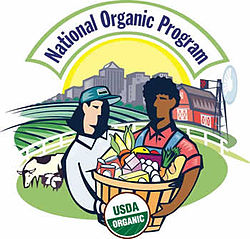

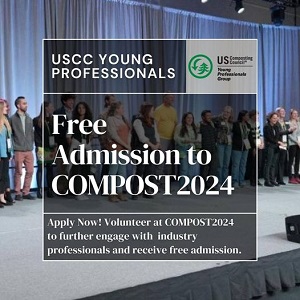
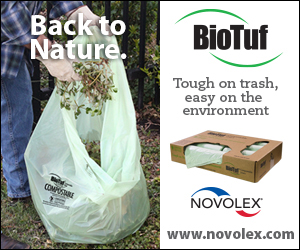
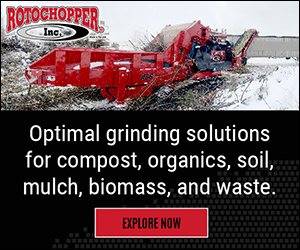
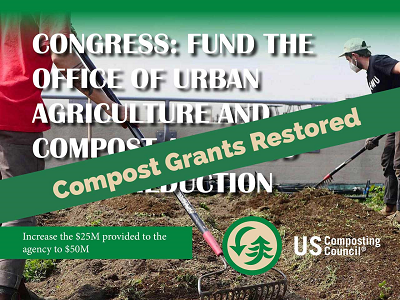 Thanks to the advocacy of USCC and others, on Nov. 1 Congress passed a mini-omnibus spending bill that restored funding for The Office of Urban Agriculture and the grants it supports. The Senate passed the Fiscal Year 2024 (FY24) Agriculture, Rural Development, Food and Drug Administration, and Related Agencies Appropriations Act, which included $8.5M for the Office of Urban Agriculture.
Thanks to the advocacy of USCC and others, on Nov. 1 Congress passed a mini-omnibus spending bill that restored funding for The Office of Urban Agriculture and the grants it supports. The Senate passed the Fiscal Year 2024 (FY24) Agriculture, Rural Development, Food and Drug Administration, and Related Agencies Appropriations Act, which included $8.5M for the Office of Urban Agriculture.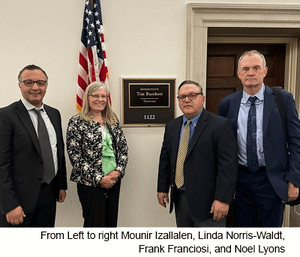
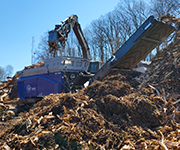
 The USCC offers a Compost Scholars Program (CSP). This program is different from the USCC’s Professional Credentials Programs—CCOM and CCP®—who already need to earn credits to stay certified.
The USCC offers a Compost Scholars Program (CSP). This program is different from the USCC’s Professional Credentials Programs—CCOM and CCP®—who already need to earn credits to stay certified.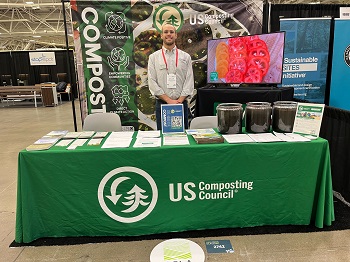 The US Composting Council recently had the opportunity to attend and exhibit at the American Society of Landscape Architects (ASLA) Conference on Landscape Architecture in Minneapolis. Our presence at the conference gave USCC an avenue to present and promote the benefits of compost application to a market segment that has the capacity to specify compost on a wide range of projects across the country. Our booth at the tradeshow was advantageously located directly across from the ASLA Climate Action Basecamp, allowing USCC the opportunity to speak on compost's role in developing climate resilient landscapes.
The US Composting Council recently had the opportunity to attend and exhibit at the American Society of Landscape Architects (ASLA) Conference on Landscape Architecture in Minneapolis. Our presence at the conference gave USCC an avenue to present and promote the benefits of compost application to a market segment that has the capacity to specify compost on a wide range of projects across the country. Our booth at the tradeshow was advantageously located directly across from the ASLA Climate Action Basecamp, allowing USCC the opportunity to speak on compost's role in developing climate resilient landscapes. 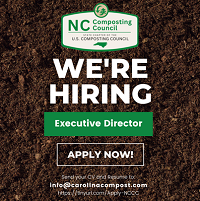
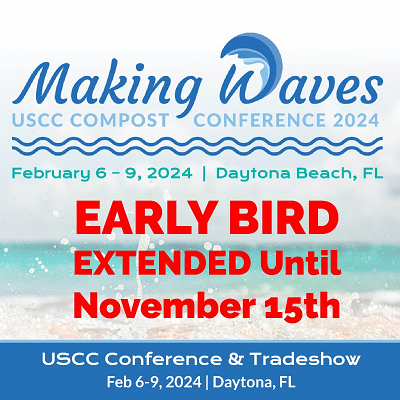
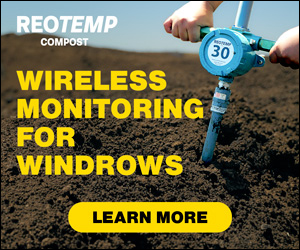

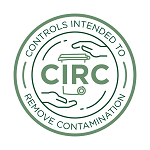 Eco-Products announced a new program to help generators keep non-compostable items out of organics streams. The “CIRC” Program (Controls Intended to Remove Contamination) will verify that restaurants and other foodservice operators are taking steps to prevent non-compostable materials from being sent to compost facilities. The program features scorecards to show composters and haulers that the necessary controls are in place to generate contaminant-free organics streams. It is “open sourced”, meaning that the scorecards and other supporting materials are available to anyone interested in using them (and not just customers and partners of Eco-Products) and the company will not be charging a fee to participate. Individual composting facilities would be able to determine their own “passing” scores, and which conditions are required vs. encouraged. To learn more, visit the CIRC webpage
Eco-Products announced a new program to help generators keep non-compostable items out of organics streams. The “CIRC” Program (Controls Intended to Remove Contamination) will verify that restaurants and other foodservice operators are taking steps to prevent non-compostable materials from being sent to compost facilities. The program features scorecards to show composters and haulers that the necessary controls are in place to generate contaminant-free organics streams. It is “open sourced”, meaning that the scorecards and other supporting materials are available to anyone interested in using them (and not just customers and partners of Eco-Products) and the company will not be charging a fee to participate. Individual composting facilities would be able to determine their own “passing” scores, and which conditions are required vs. encouraged. To learn more, visit the CIRC webpage 
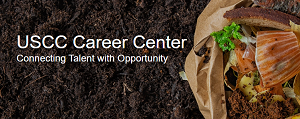
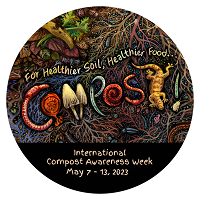 The ICAW 2024 Poster Contest ended on Nov. 1. CREF received entries from hundreds of talented artists from every part of the globe—76 countries in total. Not only is it great fun to see all the creative ways people came up with how to illustrate the theme (COMPOST…Nature’s Climate Champion!), but it is exciting to know that this message is being shared all over. Since the goal of ICAW is to build public awareness on the benefits of compost use and organics recycling, the contest is a great way to get the word out. Look for the winner to be announced by early December.
The ICAW 2024 Poster Contest ended on Nov. 1. CREF received entries from hundreds of talented artists from every part of the globe—76 countries in total. Not only is it great fun to see all the creative ways people came up with how to illustrate the theme (COMPOST…Nature’s Climate Champion!), but it is exciting to know that this message is being shared all over. Since the goal of ICAW is to build public awareness on the benefits of compost use and organics recycling, the contest is a great way to get the word out. Look for the winner to be announced by early December.